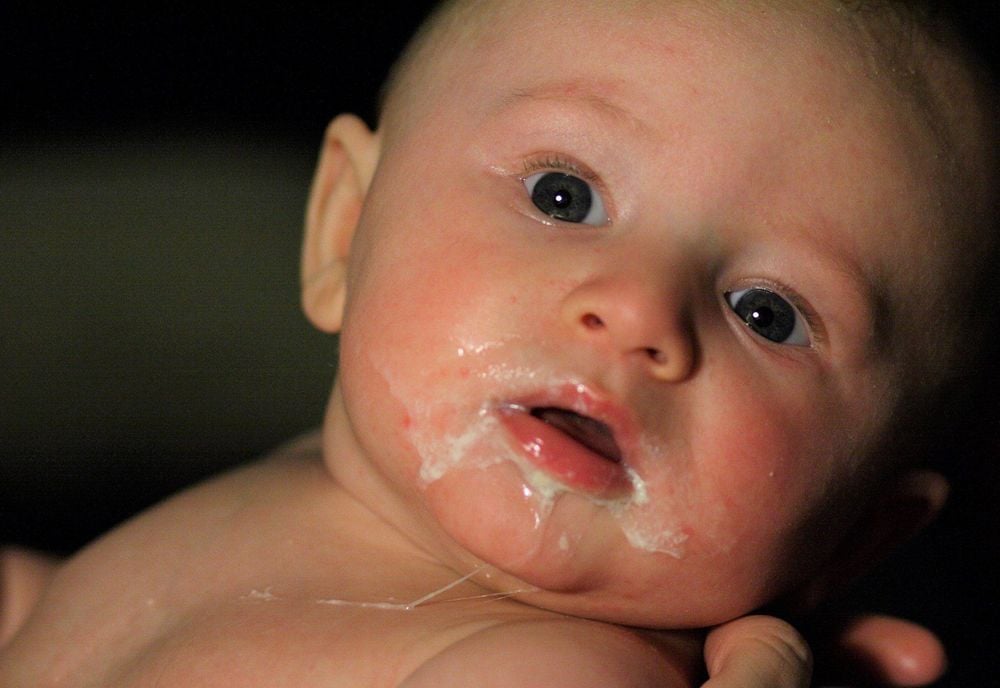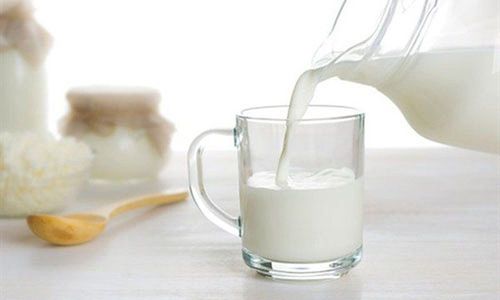In the first 6 months, most infants experience some degree of vomiting or spitting up. They may spit up milk they just drank or even curdled milk. So what exactly is curdled milk in a baby’s mouth, and how should you handle it? How do you properly clean your baby’s mouth?
1. The Phenomenon of Curdled Milk in a Baby’s Mouth
1.1 What is Curdled Milk?
Curdled milk is milk that has been partially digested in the stomach. For some reason, after feeding, the child may vomit curdled milk along with mucus. This mucus is actually gastric juices from the stomach.
If this happens only occasionally (usually up to 3 times a day), does not affect breathing, and doesn’t make the child uncomfortable, it is considered physiological vomiting or spitting up and does not need treatment.
On the other hand, if it happens frequently, causing coughing, wheezing, and accompanied by weight changes, you should take the child to see a doctor because it could be gastroesophageal reflux disease (GERD).
1.2 Causes of a Baby Spitting Up Curdled Milk
- The baby’s digestive system is still immature. The infant’s stomach lies more horizontally and higher than an adult’s, making it easy for them to spit up. A weak lower esophageal sphincter means if the baby is overfed or moved suddenly, they can spit up milk immediately while feeding.
- The baby feeds too quickly or takes in too much at once.
- Formula feeding can cause this issue because formula takes longer to digest than breast milk. Sometimes, before the milk is fully digested, the baby vomits it out. In this case, you may see curdled milk mixed with gastric juices.
Curdled milk vomiting can also be related to gastroesophageal reflux, which is common in infants and young children due to uncoordinated contractions in the digestive tract.

1.3 How to Handle Curdled Milk Vomiting?
- If your baby spits up curdled milk, stay calm and handle the situation properly:
- Do not lift the child straight up. Instead, place them on their side so the milk can flow out from the corner of their mouth without entering their nose or Eustachian tubes.
- Gently lift the baby and wipe their mouth.
- If the baby spits milk through their nose or mouth, use a nasal aspirator and clean their nose and mouth with saline solution.
- After about 30 minutes, you can feed the baby again. Avoid feeding right away as it may cause more spitting up.
2. How to Clean an Infant’s Mouth to Prevent Thrush and Curdled Milk
The mouth and tongue surfaces contain many bacteria and microorganisms that can cause unpleasant odors. If the baby’s mouth isn’t cleaned properly, they may develop thrush, which reduces or even destroys their sense of taste, leading to poor feeding, vomiting, fussiness, and refusing to nurse.
Maintaining oral hygiene is very important not only for adults but also for young children, especially newborns. Infants cannot clean their own mouths, so parents must know the correct cleaning methods to ensure their child’s oral health.
There are two main ways to clean a baby’s mouth:
Daily cleaning to remove milk residue and prevent curdled milk buildup.
Cleaning when the baby has thrush.
2.1 Daily Mouth Cleaning to Remove Milk Residue and Curdled Milk
- When to Clean:
Clean the mouth after the baby finishes feeding. This helps remove any milk residue left on the tongue’s surface. Milk residue appears as tiny white spots on the tongue’s mucosa after feeding. It doesn’t cause pain, easily washes away with saliva, and often occurs when a baby falls asleep with milk in their mouth or is fed formula.
- How to Clean:
- Wash your hands thoroughly with a disinfectant solution.
- Place the baby on a bed or on your lap.
- Wrap a piece of sterile gauze around your index finger or use a special finger-shaped gauze swab.
- Dip your gauze-wrapped finger in 0.9% saline solution or cooled boiled water. Gently touch the baby’s lower lip to help them open their mouth. Then carefully move your finger around the tongue, palate, gums, throat, etc., to clean the mouth. (Do not push too deep, as it may trigger gagging.)
Place your finger at the base of the tongue and pull outward to remove milk residue underneath.
2.2 Cleaning the Mouth When the Baby Has Thrush
Unlike milk residue or curdled milk, thrush appears as thick white plaques that are firmly attached to the mucosa of the mouth and tongue. They are hard to remove and can cause pain, bleeding, and discomfort. Thrush is caused by the fungus Candida albicans, which exists in the baby’s mouth.
Cleaning thrush is similar to daily mouth cleaning but requires antifungal medication.
How to Clean Thrush:
- Wash your hands thoroughly before cleaning the baby’s mouth.
- Place the baby on a bed or hold them on your lap.
- Wrap gauze around your index finger or use a finger-shaped gauze swab.
- Dip your gauze-wrapped finger into a solution of Nystatin (500,000 units) and gently touch the baby’s lower lip to open their mouth. Carefully wipe the tongue’s surface. Don’t go too deep to avoid triggering vomiting.
- Use another gauze piece to clean the inner cheeks, palate, and gums.
- Place your finger at the base of the tongue and pull outward to remove any remaining residue.
- Repeat a second time if the thrush is severe.
- Clean the thrush-affected areas 4 times a day with antifungal agents prescribed by a doctor. After the thrush clears up, continue cleaning for 2 more days to ensure it’s completely gone.

3. Some Ways to Prevent Babies from Spitting Up Curdled Milk
- Breastfeed correctly, do not overfeed. Feed just enough and consider smaller, more frequent meals.
- If possible, breastfeed directly from the mother, rather than using a bottle. This helps the baby’s stomach expand properly and reduces the risk of vomiting due to stomach contractions.
- Consider the baby’s position while feeding: prop them up at about a 30-degree angle. Semi-upright feeding helps reduce spitting up.
- After feeding, hold the baby upright for at least 30 minutes.
- If bottle-feeding, choose a proper bottle, mix formula correctly, and do not let the bottle lie flat. This prevents milk from completely flooding the nipple, which can cause choking.
- Feed the baby when they are alert, comfortable, not tired or sleepy.
- Don’t force the baby to eat more than they normally can.
In the 0-6 month stage, it’s common for babies to spit up milk, have curdled milk residue, or develop thrush. Mothers should learn the skills to care for their babies in these situations so they can handle them calmly and effectively.
The pediatric department at the Vinmec International General Hospital system specializes in treating conditions common in infants and children, such as viral fever, bacterial fever, ear infections, pneumonia, etc. With modern equipment, sterile environments, and experienced doctors, parents no longer have to worry about the examination and treatment process.
To arrange an appointment, please call HOTLINE or make your reservation directly HERE. You may also download the MyVinmec app to schedule appointments faster and manage your reservations more conveniently.














